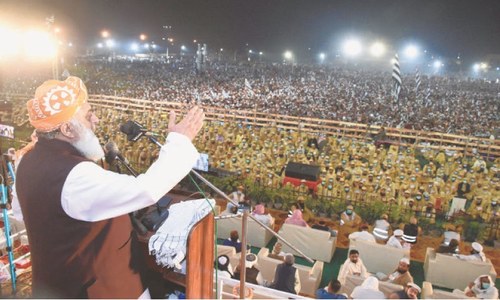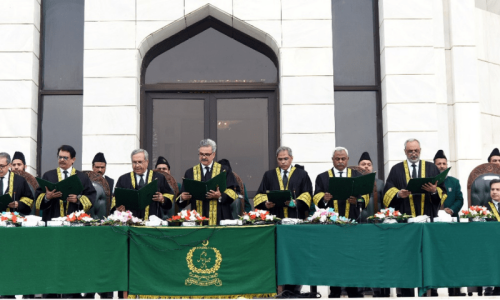FOR democracy to work in any country, elections must be free, fair and held within the constitutionally stipulated time frame. This, unfortunately, has not been the case in Pakistan, where frequent military interventions have overthrown civilian governments adding to democracy’s slowdown, even regression. Today, too, with the PDM gunning for the PTI-led administration’s ouster, the root cause of the crisis is the perceived lack of legitimacy of the polls and the opposition’s refusal to accept the rulers.
Indeed, it has been a shaky journey ever since the first genuinely democratic polls were held in Pakistan 50 years ago in 1970. However, due to non-acceptance of the Awami League’s mandate as the biggest party in parliament, just a year after the historic elections the country’s erstwhile eastern wing seceded. Yet it appears few lessons were learnt from that tragedy. Interference and manipulation of the electoral process has continued despite this sobering episode. King’s parties and wobbly electoral alliances are cobbled together to counter those political forces which are perceived to be straying from a narrative promoted by unelected quarters.
Apart from the establishment’s interference, losing parties have consistently raised questions about the legitimacy of election results. There are several examples such as the PNA’s rejection of the PPP’s debatable victory in 1977, the PPP and PML contesting the results when either party won in the 1990s, and decades later, Imran Khan crying foul over the 2013 election results, accusing the PML-N of rigging. Massive rallies and a dharna in Islamabad were organised by the PTI. Today, history is repeating itself as the PDM slams the PTI government. Frequently, manipulative practices by the parties, often with the silent approval of the establishment, have discredited the electoral process. For example, at the height of its power, the MQM was widely accused of ballot stuffing in Karachi. Other parties have indulged in similar practices, especially in areas where ‘influentials’ hold sway.
To ensure that the country has a credible electoral system several things are needed. Firstly, all forces should realise that the beauty of democracy lies in an electoral process and rule that is allowed to evolve unhindered. Let the people choose their representatives, and let them complete their terms. Secondly, genuine electoral reform is sorely needed, so that the process is seen to be transparent, and accusations of electoral fraud are reduced to a minimum. This can best be done within parliament, through consensus on electoral reforms and an independent election commission accepted by all political players. Thirdly, parties themselves need to practise democracy and promote democratic norms within their ranks, instead of indulging in dynastic politics, or siding with unelected quarters for paltry gains. Unless all stakeholders take electoral reforms seriously, the Pakistani voter may end up becoming alienated from the voting process.
Published in Dawn, December 14th, 2020














































